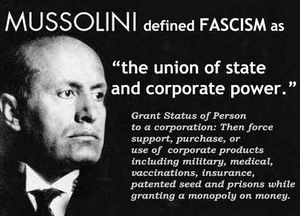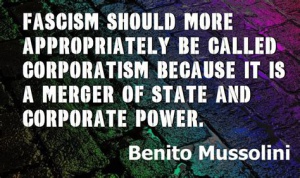Fascism: Difference between revisions
No edit summary |
No edit summary |
||
| Line 2: | Line 2: | ||
'''[[Fascism]] is an authoritarian and nationalistic right-wing system of government and social organization.''' | '''[[Fascism]] is an authoritarian and nationalistic right-wing system of government and social organization.''' | ||
The use of terms like "right-wing" is ambiguous if not deceptive. | |||
Fascism has been described as a merging of corporate and government interests. It should not be suggested that Fascism requires corporations to take over the government because it only requires that an Oligarchy control be inserted over the entire country. | Fascism has been described as a merging of corporate and government interests. It should not be suggested that Fascism requires corporations to take over the government because it only requires that an Oligarchy control be inserted over the entire country. | ||
The | The State as an institution itself has a [[Corporation|corporate]] nature to it. Even the United States government was literally a [[corporation]] with the ratification of the [[CCC|Constitution]] by the individual States. | ||
Because the states ''were still as foreign to each other as Mexico is to Canada'' there was till a limit to the potential of fascism in America. But with the defeat of the southern states, their rights and the [http://www.preparingyou.com/wiki/index.php?search=14th+Amendment&fulltext=Search&title=Special%3ASearch 14th Amendment] with its acceptance of both individuals and [[Corporation|corporations]] as ''persons'' of the United States the potential for fascism increased. | |||
Mussolini states that the corporations were the most important part of a nation and that the government should support them over the rights of the individual for the greater good. He established this merger and called it [[Fascism]] to differentiate it from mere [[Socialism]]. | Mussolini states that the corporations were the most important part of a nation and that the government should support them over the rights of the individual for the greater good. He established this merger and called it [[Fascism]] to differentiate it from mere [[Socialism]]. | ||
Fascism often includes a “belligerent nationalism” which is imposed upon the people as a [[collectivism|collective]]. This may include the philosophy of "My country right or wrong" putting aside a quest for righteousness. This of course puts individual or Natural rights in a subordinate position to the state. This is achieved in a [[Democracy]] more than a [[Republic]] and of | Fascism often includes a “belligerent nationalism” which is imposed upon the people as a [[collectivism|collective]]. This may include the philosophy of "My country right or wrong" putting aside a quest for [[righteousness]] in exchange for the assumed security and benefits of the socialist collective. This of course puts individual or ''Natural rights'' in a subordinate position to the state. This is achieved in a [[Democracy]] more than a [[Republic]] and of course democracies lead to [[Socialism]] according to Marx. | ||
[[File:Corporatism.jpg|right|thumb|px250|[[Corporatism]] is not [[capitalism]] but a political system which may be more in line with [[fascism]].]] | [[File:Corporatism.jpg|right|thumb|px250|[[Corporatism]] is not [[capitalism]] but a political system which may be more in line with [[fascism]].]] | ||
Another, more modern term for Fascism could be [[Corporatism]]. Fascism is often a method of governing that implies total government control and oppression of all dissenting opinions while [[Socialism]] is a method of governing where the government controls goods and resources and decides for the people who needs or is entitled to what and | Another, more modern term for Fascism could be [[Corporatism]]. Fascism is often a method of governing that implies total government control and oppression of all dissenting opinions while [[Socialism]] is a method of governing where the government controls ''goods and resources'' and decides for the people who needs or is entitled to what. Since people are the primary means of production and [[socialism]] is a political and economic system the labor of everyone will be held in common by the state. | ||
It will often define ''good and evil'' through the appointed ruler, judiciary and the legislature. It discounts human nature that is corrupted by the power to decide ''good and evil'' for others. | |||
[[Capitalism]] is a method where private individuals are in control of the distribution of goods they individually produce and relies on a free market forces. | |||
There is no forced government distribution of wealth and therefore to remain free a capitalist society must depend on voluntary [[charity|charitable]] institutions with out central rulers, [[anarchist|anarchy]], for the redistribution of wealth. It thrives on honest competition and produces innovation as people act on the basic human nature of providing for their own needs and wants without the [[covetous practices]] of [[Democracy|democracies]] nor [[Socialism]] in the management of social [[welfare]]. | |||
Granting the status of a person to a corporation is the beginning of centralization of power in [[society]] that leads to fascism. [[Socialism]] in its extreme form like [[Communism]] also leads to a fascist state because it centralizes control which draws to itself corruption and weakens the people. | Granting the status of a person to a corporation is the beginning of centralization of power in [[society]] that leads to fascism. Granting power to a democracy is a centralization of the power of choice in the hands of 51% which leads to socialism. [[Socialism]] in its extreme form like [[Communism]] also leads to a fascist state because it centralizes control which draws to itself corruption and weakens the people. | ||
[[Polybius]] and [[Plutarch]] warned against people living at the expense of others through the power and force of governments which exercise authority one over the other. [[John the Baptist]], [[Jesus]] and the [[ministers]] of the [[early Church]] which promoted and facilitated "'''[[Pure Religion]]'''" all opposed the [[covetous practices]] of the "[[benefactors]]" and "[[fathers]]" of the [[world]] which leads to [[fascism]] and [[bondage]]. | [[Polybius]] and [[Plutarch]] warned against people living at the expense of others through the power and force of governments which exercise authority one over the other. [[John the Baptist]], [[Jesus]] and the [[ministers]] of the [[early Church]] which promoted and facilitated "'''[[Pure Religion]]'''" all opposed the [[covetous practices]] of the "[[benefactors]]" and "[[fathers]]" of the [[world]] which leads to [[fascism]] and [[bondage]]. | ||
Revision as of 15:46, 16 June 2020

Fascism is an authoritarian and nationalistic right-wing system of government and social organization.
The use of terms like "right-wing" is ambiguous if not deceptive.
Fascism has been described as a merging of corporate and government interests. It should not be suggested that Fascism requires corporations to take over the government because it only requires that an Oligarchy control be inserted over the entire country.
The State as an institution itself has a corporate nature to it. Even the United States government was literally a corporation with the ratification of the Constitution by the individual States.
Because the states were still as foreign to each other as Mexico is to Canada there was till a limit to the potential of fascism in America. But with the defeat of the southern states, their rights and the 14th Amendment with its acceptance of both individuals and corporations as persons of the United States the potential for fascism increased.
Mussolini states that the corporations were the most important part of a nation and that the government should support them over the rights of the individual for the greater good. He established this merger and called it Fascism to differentiate it from mere Socialism.
Fascism often includes a “belligerent nationalism” which is imposed upon the people as a collective. This may include the philosophy of "My country right or wrong" putting aside a quest for righteousness in exchange for the assumed security and benefits of the socialist collective. This of course puts individual or Natural rights in a subordinate position to the state. This is achieved in a Democracy more than a Republic and of course democracies lead to Socialism according to Marx.

Another, more modern term for Fascism could be Corporatism. Fascism is often a method of governing that implies total government control and oppression of all dissenting opinions while Socialism is a method of governing where the government controls goods and resources and decides for the people who needs or is entitled to what. Since people are the primary means of production and socialism is a political and economic system the labor of everyone will be held in common by the state.
It will often define good and evil through the appointed ruler, judiciary and the legislature. It discounts human nature that is corrupted by the power to decide good and evil for others.
Capitalism is a method where private individuals are in control of the distribution of goods they individually produce and relies on a free market forces.
There is no forced government distribution of wealth and therefore to remain free a capitalist society must depend on voluntary charitable institutions with out central rulers, anarchy, for the redistribution of wealth. It thrives on honest competition and produces innovation as people act on the basic human nature of providing for their own needs and wants without the covetous practices of democracies nor Socialism in the management of social welfare.
Granting the status of a person to a corporation is the beginning of centralization of power in society that leads to fascism. Granting power to a democracy is a centralization of the power of choice in the hands of 51% which leads to socialism. Socialism in its extreme form like Communism also leads to a fascist state because it centralizes control which draws to itself corruption and weakens the people.
Polybius and Plutarch warned against people living at the expense of others through the power and force of governments which exercise authority one over the other. John the Baptist, Jesus and the ministers of the early Church which promoted and facilitated "Pure Religion" all opposed the covetous practices of the "benefactors" and "fathers" of the world which leads to fascism and bondage.
Government |
Governments |
Civil Government |
Government and Liberty Described |
Social contract |
Covenants of the gods |
Contracts, Covenants and Constitutions |
Nationalism |
Republic |
Democracy |
Minarchism |
Statism |
Fascism |
Tyranny |
Despotism |
Federation
Communism |
Anarcho communism |
Communist Manifesto |
Communist Altruism |
Primitive Communism |
Karl Marx Marriage |
Collectivism |
Altruism |
Saul Syndrome |
Foolishly |
Anarchist |
Capitalism |
Socialism |
Rules For Radicals |
Atheist |
Viable republic |
Republican form |
Titular |
The Way |
Perfect law of liberty |
NAP |
Taxation |
Tribute |
Tithe |
Tithing |
Pay tribute |
Legal charity |
Social Security |
Corban |
Hierarchy |
Imperial Cult of Rome |
The Democracy Cult |
Employ |
Bondage |
Mammon |
Temples |
Cain |
Nimrod |
Pharaoh |
Caesar |
Law |
Mystery Babylon |
Saving Babylon |
Exiting Babylon |
Supreme being |
gods many |
Ideological subversion |
Schools as Tools |
Roots of the Welfare State |
Covetous Practices |
Consent not |
Withdraw consent |
Come out |
Put out |
Cry out |
Voice |
Kingdom of God |
Church legally defined |
Pure Religion |
Christian conflict |
If you need help:
- Or want to help others:
Join The Living Network of The Companies of Ten
The Living Network |
Join Local group |
About |
Purpose |
Guidelines |
Network Removal
Contact Minister |
Fractal Network |
Audacity of Hope |
Network Links